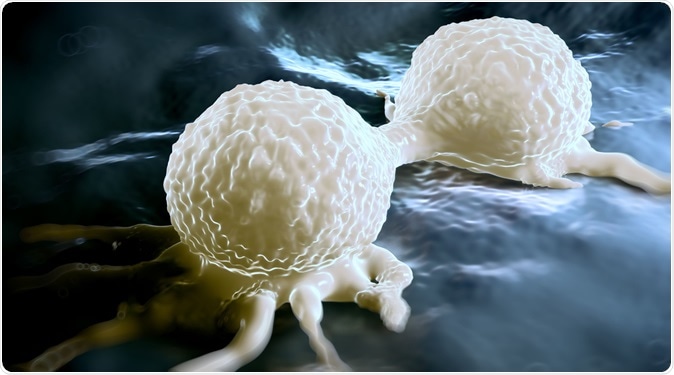Breast cancer survivors like many other cancer survivors live in fear of relapse of their cancer after they have been in remission. Researchers have now developed a tool by which they can predict accurately the time when the cancer is likely to return. The results of this study were published in the latest issue of the journal Nature.

Dividing breast cancer cell. Image Credit: Shutterstock
The new test is one of the firsts of its kind that can predict the return of the cancer within two decades of remission. The researchers explain that there are 11 types of breast cancer and all of them have a different risk of returning or relapsing. The test would soon determine which of the women need to worry the least about their cancer returning and which women have a high risk of getting a relapse of their cancers. This prediction comes from the genetic make-up of the tumours, the team of researchers from the University of Cambridge and Stanford University explain.
The team used genetic make-up from the tumours of nearly 2,000 breast cancer patients and followed them for a period of an average of 14 years. They are at present working on simplifying the test so that doctors can use the test easily on their patients. The simpler and easier-to-use version may be available for use within the next five years say the researchers.
According to a statement from Professor Carlos Caldas, lead researcher at the Cancer Research UK Cambridge Institute, “Treatments for breast cancer have improved dramatically in recent years. But unfortunately for some women, their breast cancer returns and spreads, becoming incurable. For some, this can be many years later - but it's been impossible to accurately predict who is at risk of recurrence and who is all clear. In this study, we've delved deeper into breast cancer molecular subtypes so we can more accurately identify who might be at risk of relapsing and uncover new ways of treating them.” Dr Oscar Rueda, lead author of the paper said, “We’ve shown that the molecular nature of a woman’s breast cancer determines how their disease could progress, not just for the first five years, but also later. We hope that our research tool can be turned into a test doctors can easily use to guide treatment recommendations.” At present tumour size, aggressiveness, age of the patient and tumour type is used to predict its relapse. The researchers explain that using the genetic make-up may be a more precise method.
They noted that one of the deadliest types of breast cancer is the “triple negative” cancer. However if the patient survives the first five years after diagnosis and treatment, their cancer return risk is small. Some cancers on the other hand have a genetic picture that makes their return within 20 years a 50 percent likelihood. There are eight types of the “estrogen receptor positive” cancer. Of these four have a good chance of not recurring within 20 years while the other four have a high risk of relapsing (40 to 62 percent chance). Triple negative cancer also has a greater chance of spreading to the brain while estrogen receptor positive cancer and HER2-negative cancer has a greater chance of spreading to the bone, the team writes.
Professor Karen Vousden, chief scientist for Cancer Research UK, in a statement said, “One in seven women will get breast cancer in their lifetime in the UK, and we hope that research like this will mean that if faced with the disease, even more of our daughters and granddaughters will survive.” She added, “We're still a way off being able to offer this type of detailed molecular testing to all women and we need more research to understand how we can tailor treatments to a patient's individual tumour biology. But this is incredibly encouraging progress.”
The researchers are planning a larger study with around 12000 women to establish their hypotheses and make the test a reality. Prof Caldas said, “I would not recommend it clinically yet, but we really are committed to making this available. We are totally committed to having an NHS test, we haven't patented any of this.”
Source: https://www.nature.com/articles/s41586-019-1007-8